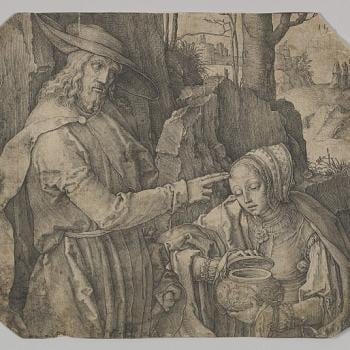The Anglican tradition marks today as a feast for the poet and Anglican priest George Herbert.
He was born on the 3rd of April, 1593 to a prominent family in Montgomery, Wales. His mother was a friend of and patron to John Donne, as well as other writers, poets, and artists.
He graduated Cambridge with a master’s degree and was elected to the faculty of the university. While he started off focused on a political life, at some point turned toward the church.
Herbert was ordained a priest in 1629 and became rector of a rural parish. He died only three years later on March 1st, 1633.
His friend Nicholas Ferrar gathered his poetry and published it in a single volume, “The Temple.” With this and a few other writings, he would gain posthumous fame as one England’s greatest Metaphysical poets.
One of his poems I feel has more than a bit of Zen sensibility goes
I struck the board, and cry’d, ‘No more;
I will abroad.’
What, shall I ever sigh and pine?
My lines and life are free; free as the rode,
Loose as the wind, as large as store.
Shall I be still in suit?
Have I no harvest but a thorn
To let me blood, and not restore
What I have lost with cordial fruit?
Sure there was wine
Before my sighs did drew it: there was corn
before my tears did drown it.
Is the years only lost to me?
Have I no bare to crown it;
No flowers, no garlands gay? all blasted,
All wasted?
No so, my heart; but there is fruit,
And thou hast hands.
Recover all they sigh-blown age
On double pleasures; leave they cold dispute
Of what is fit and not; forsake thy cage,
Thy rope of sands,
Which petite thoughts have made; and made to thee
Good cable, to enforce and draw
And be thy law,
While thou didst wink and would not see.
Away! take heed;
I will abroad,
Call in thy death’s-head there, tie up thy fears;
He that forbears
To suit and serve his need
Deserves his load.
But as I raved and grew more fierce and wilde
At every word,
Me thought I heard one calling, ‘Childe’;
And I reply’d, ‘My Lord.’
The great R. H. Blythe commented on Herbert’s poem, “This is the essence of all religion; the hardness of iron, the softness of wool, the blueness of the distant mountains, the coldness of water, – it is the will of God, the will of Nature, receive it without hesitation.”
Me, I am more inclined to thinking of this as the song of the dark night. Which, of course, is the threshold to our heart’s awakening. Nothing is left. Only call and response.
Intimate presence to the awful and beautiful.
…
If you prefer to hear it, well, here you go…













